formerly eScholarship Editions


|
|
|
|
Your request for similar items found 20 book(s). | Modify Search | Displaying 1 - 20 of 20 book(s) | |
| 1. | 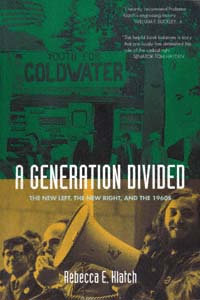 | Title: A generation divided: the new left, the new right, and the 1960s Author: Klatch, Rebecca E Published: University of California Press, 1999 Subjects: Sociology | American Studies | Politics Publisher's Description: The 1960s was not just an era of civil rights, anti-war protest, women's liberation, hippies, marijuana, and rock festivals. The untold story of the 1960s is in fact about the New Right. For young conservatives the decade was about Barry Goldwater, Ayn Rand, an important war in the fight against communism, and Young Americans for Freedom (YAF). In A Generation Divided , Rebecca Klatch examines the generation that came into political consciousness during the 1960s, telling the story of both the New Right and the New Left, and including the voices of women as well as men. The result is a riveting narrative of an extraordinary decade, of how politics became central to the identities of a generation of people, and how changes in the political landscape of the 1980s and 1990s affected this identity. [brief] Similar Items |
| 2. | 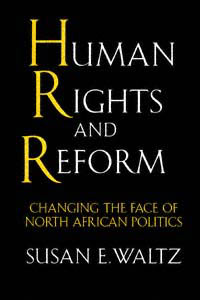 | Title: Human rights and reform: changing the face of North African politics Author: Waltz, Susan Eileen Published: University of California Press, 1995 Subjects: Politics | History | Middle Eastern Studies | Middle Eastern History | African History | African Studies Publisher's Description: Independence from colonial rule did not usher in the halcyon days many North Africans had hoped for, as the new governments in Morocco, Tunisia, and Algeria soon came to rely on repression to reinforce and maintain power. In response to widespread human rights abuses, individuals across the Maghrib began to form groups in the late 1970s to challenge the political practices and structures in the region, and over time these independent human rights organizations became prominent political actors. The activists behind them are neither saints nor revolutionaries, but political reformers intent on changing political patterns that have impeded democratization.This study, the first systematic comparative analysis of North African politics in more than a decade, explores the ability of society, including Islamist forces, to challenge the powers of states. Locating Maghribi polities within their cultural and historical contexts, Waltz traces state-society relations in the contemporary period. Even as Algeria totters at the brink of civil war and security concerns rise across the region, the human rights groups Susan Waltz examines implicitly challenge the authoritarian basis of political governance. Their efforts have not led to the democratic transition many had hoped, but human rights have become a crucial new element of North African political discourse. [brief] Similar Items |
| 3. | 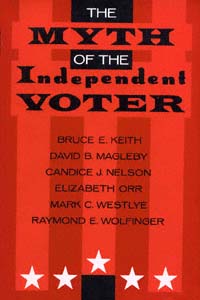 | Title: The Myth of the Independent voter Author: Keith, Bruce E Published: University of California Press, 1992 Subjects: Politics | American Studies Publisher's Description: Few events in American politics over the past two decades have generated more attention than the increasing number of voters calling themselves Independent. By the early 1970s Independents outnumbered Republicans, according to many eminent experts on voting behavior. Yet the authors of this incisive new commentary on American politics claim that most of this widespread speculation on declining party affiliation is simply wrong. They contend that most so-called Independents lean strongly toward one of the two parties and resemble - in all important respects - either Democrats or Republicans. Contrary to expert opinion, only a small segment of voters are truly "independent" of either major party.Based on the most up-to-date 1990 data, The Myth of the Independent Voter provides a roadmap of the political arena for the general reader and scholar alike. Debunking conventional wisdom about voting patterns and allaying recent concerns about electoral stability and possible third party movements, the authors uncover faulty polling practices that have resulted in a skewed sense of the American voting population.Demonstrating that most of what has been written about Independents for more than thirty years is myth, this challenging book offers a trenchant new understanding of the party system, voting behavior, and public opinion. [brief] Similar Items |
| 4. | 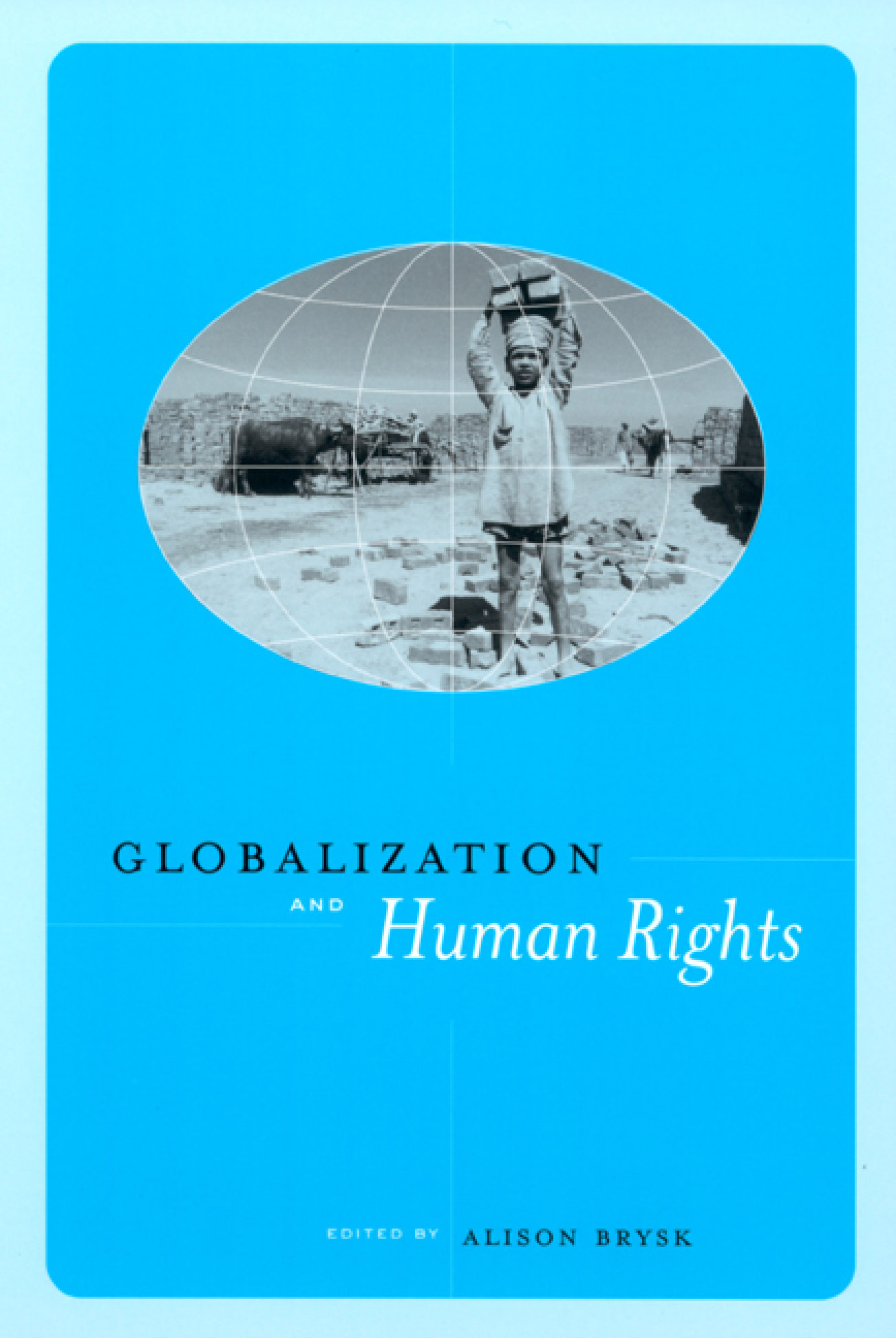 | Title: Globalization and human rights Author: Brysk, Alison 1960- Published: University of California Press, 2002 Subjects: Politics | International Relations Publisher's Description: In this landmark volume, Alison Brysk has assembled an impressive array of scholars to address new questions about globalization and human rights. Is globalization generating both problems and opportunities? Are new problems replacing or intensifying state repression? How effective are new forms of human rights accountability? These essays include theoretical analyses by Richard Falk, Jack Donnelly, and James Rosenau. Chapters on sex tourism, international markets, and communications technology bring new perspectives to emerging issues. The authors investigate places such as the Dominican Republic, Nigeria, and the Philippines. The contemporary world is defined by globalization. While global human rights standards and institutions have been established, assaults on human dignity continue. These essays identify the new challenges to be faced, and suggest new ways to remedy the costs of globalization. [brief] Similar Items |
| 5. | 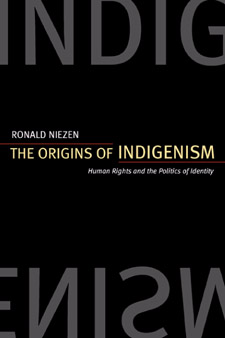 | Title: The origins of indigenism: human rights and the politics of identity Author: Niezen, Ronald Published: University of California Press, 2003 Subjects: Anthropology | Ethnic Studies | International Relations | Social Problems Publisher's Description: "International indigenism" may sound like a contradiction in terms, but it is indeed a global phenomenon and a growing form of activism. In his fluent and accessible narrative, Ronald Niezen examines the ways the relatively recent emergence of an internationally recognized identity - "indigenous peoples" - intersects with another relatively recent international movement - the development of universal human rights laws and principles. This movement makes use of human rights instruments and the international organizations of states to resist the political, cultural, and economic incursions of individual states. The concept "indigenous peoples" gained currency in the social reform efforts of the International Labor Organization in the 1950s, was taken up by indigenous nongovernmental organizations, and is now fully integrated into human rights initiatives and international organizations. Those who today call themselves indigenous peoples share significant similarities in their colonial and postcolonial experiences, such as loss of land and subsistence, abrogation of treaties, and the imposition of psychologically and socially destructive assimilation policies. Niezen shows how, from a new position of legitimacy and influence, they are striving for greater recognition of collective rights, in particular their rights to self-determination in international law. These efforts are influencing local politics in turn and encouraging more ambitious goals of autonomy in indigenous communities worldwide. [brief] Similar Items |
| 6. |  | Title: A critical cinema 3: interviews with independent filmmakers Author: MacDonald, Scott 1942- Published: University of California Press, 1998 Subjects: Cinema and Performance Arts | Film Publisher's Description: A Critical Cinema 3 continues Scott MacDonald's compilation of personal interviews and public discussions with major contributors to independent filmmaking and film awareness. An informative exchange with Amos Vogel, whose Cinema 16 Society drew American filmgoers into a broader sense of film history, is followed by interviews reflecting a wide range of approaches to filmmaking. Sally Potter discusses her popular feature, Orlando , in relation to the experimental work that preceded it, and Canadian independent John Porter argues compellingly for small-gauge, Super-8mm filmmaking. Ken Jacobs discusses the "Nervous System" apparatus with which he transforms old film footage into new forms of motion picture art; Jordan Belson describes his Vortex Concerts, ancestors of modern laser light shows; and Elias Merhige talks about going beneath the "rational structure of meaning" in Begotten . A Critical Cinema 3 presents independent cinema as an international and multiethnic phenomenon. MacDonald interviews filmmakers from Sweden, France, Italy, Austria, Armenia, India, the Philippines, and Japan and examines the work of African Americans, European Americans, Asian Americans, and Hispanics. He provides an introductory overview of each interviewee, as well as detailed film/videographies and selected bibliographies. With its predecessors, A Critical Cinema (California, 1988) and A Critical Cinema 2 (California, 1992), this is the most extensive, in-depth exploration of independent cinema available in English. [brief] Similar Items |
| 7. | 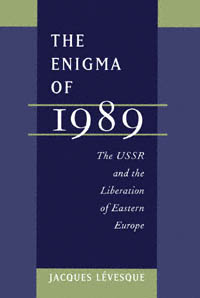 | Title: The enigma of 1989: the USSR and the liberation of Eastern Europe Author: Lévesque, Jacques Published: University of California Press, 1997 Subjects: Politics | History | European History | Russian and Eastern European Studies Publisher's Description: The Soviet external empire fell in 1989 virtually without bloodshed. The domino-like collapse of the communist regimes of Eastern Europe was not anticipated by political experts in either the East or the West. Most surprising of all was the Soviet Union's permissive reactions to the secession. For the first time in modern history, such an epochal upheaval could take place not only without war but also without major international tensions.This book is the first comprehensive scholarly attempt to elucidate Soviet behavior toward Eastern Europe in 1989. Jacques Lévesque thoroughly analyses the policies of the USSR toward Eastern Europe during the Gorbachev era and clarifies the goals that underpinned these policies.Based on interviews with political leaders and exhaustive research in Russia, Czechoslovakia, Hungary, Poland, and the other ex-Warsaw Pact countries, this book traces the nuances of each country's case as a set of continually changing, mutually reinforcing causes and effects. [brief] Similar Items |
| 8. | 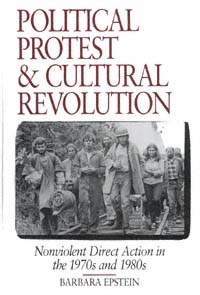 | Title: Political protest and cultural revolution: nonviolent direct action in the 1970s and 1980s Author: Epstein, Barbara Published: University of California Press, 1991 Subjects: History | Politics | American Studies | United States History | Sociology Publisher's Description: From her perspective as both participant and observer, Barbara Epstein examines the nonviolent direct action movement which, inspired by the civil rights movement, flourished in the United States from the mid-seventies to the mid-eighties. Disenchanted with the politics of both the mainstream and the organized left, and deeply committed to forging communities based on shared values, activists in this movement developed a fresh, philosophy and style of politics that shaped the thinking of a new generation of activists. Driven by a vision of an ecologically balanced, nonviolent, egalitarian society, they engaged in political action through affinity groups, made decisions by consensus, and practiced mass civil disobedience.The nonviolent direct action movement galvanized originally in opposition to nuclear power, with the Clamshell Alliance in New England and then the Abalone Alliance in California leading the way. Its influence soon spread to other activist movements - for peace, non-intervention, ecological preservation, feminism, and gay and lesbian rights.Epstein joined the San Francisco Bay Area's Livermore Action Group to protest the arms race and found herself in jail along with a thousand other activists for blocking the road in front of the Lawrence Livermore Laboratory. She argues that to gain a real understanding of the direct action movement it is necessary to view it from the inside. For with its aim to base society as a whole on principles of egalitarianism and nonviolence, the movement sought to turn political protest into cultural revolution. [brief] Similar Items |
| 9. | 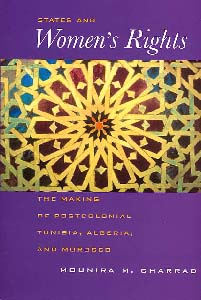 | Title: States and women's rights: the making of postcolonial Tunisia, Algeria, and Morocco Author: Charrad, M. (Mounira) Published: University of California Press, 2001 Subjects: Sociology | Politics | Middle Eastern Studies | Middle Eastern History | Women's Studies | Postcolonial Studies | Law Publisher's Description: At a time when the situation of women in the Islamic world is of global interest, here is a study that unlocks the mystery of why women's fates vary so greatly from one country to another. Mounira M. Charrad analyzes the distinctive nature of Islamic legal codes by placing them in the larger context of state power in various societies. Charrad argues that many analysts miss what is going on in Islamic societies because they fail to recognize the logic of the kin-based model of social and political life, which she contrasts with the Western class-centered model. In a skillful synthesis, she shows how the logic of Islamic legal codes and kin-based political power affect the position of women. These provide the key to Charrad's empirical puzzle: why, after colonial rule, women in Tunisia gained broad legal rights (even in the absence of a feminist protest movement) while, despite similarities in culture and religion, women remained subordinated in post-independence Morocco and Algeria. Charrad's elegant theory, crisp writing, and solid scholarship make a unique contribution in developing a state-building paradigm to discuss women's rights.This book will interest readers in the fields of sociology, politics, law, women's studies, postcolonial studies, Middle Eastern studies, Middle Eastern history, French history, and Maghrib studies. [brief] Similar Items |
| 10. | 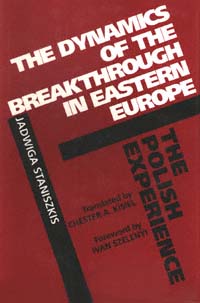 | Title: The dynamics of the breakthrough in Eastern Europe: the Polish experience Author: Staniszkis, Jadwiga Published: University of California Press, 1991 Subjects: Politics | European History | Sociology Publisher's Description: Understanding the dramatic political, social, and economic changes that have taken place in Poland in the mid-1980s is one key to predicting the future of the communist bloc. Jadwiga Staniszkis, an influential, internationally known expert on contemporary trends in Eastern Europe, provides an insider's analysis that deserves the attention of all scholars interested in the region.Staniszkis presents the breakthrough of 1989 as a consequence not only of systemic contradictions within socialism but also of a series of chance events. These events include unique historical circumstances such as the emergence of the "globalist" faction in Mosow, with its new, world-system perception of crisis, and the discovery of the round-table technique as a productive ritual of communication, imitated all over Eastern Europe. After describing the development, collapse, and reorganization of a "new center" in Poland in 1989-1990, she discusses the first attempt at privatizing the economy. Her analysis of the dilemmas accompanying breakthrough and transition is an invaluable guide to the challenges that face both capitalism and democracy in Eastern Europe. [brief] Similar Items |
| 11. | 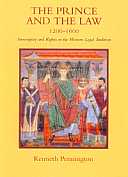 | Title: The prince and the law, 1200-1600: sovereignty and rights in the western legal tradition Author: Pennington, Kenneth Published: University of California Press, 1993 Subjects: History | Medieval History | Law Publisher's Description: The power of the prince versus the rights of his subjects is one of the basic struggles in the history of law and government. In this masterful history of monarchy, conceptions of law, and due process, Kenneth Pennington addresses that struggle and opens an entirely new vista in the study of Western legal tradition.Pennington investigates legal interpretations of the monarch's power from the twelfth to the seventeenth century. Then, tracing the evolution of defendants' rights, he demonstrates that the origins of due process are not rooted in English common law as is generally assumed. It was not a sturdy Anglo-Saxon, but, most probably, a French jurist of the late thirteenth century who wrote, "A man is innocent until proven guilty."This is the first book to examine in detail the origins of our concept of due process. It also reveals a fascinating paradox: while a theory of individual rights was evolving, so, too, was the concept of the prince's "absolute power." Pennington illuminates this paradox with a clarity that will greatly interest students of political theory as well as legal historians. [brief] Similar Items |
| 12. | 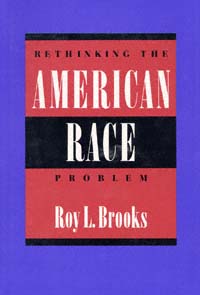 | Title: Rethinking the American race problem Author: Brooks, Roy L. (Roy Lavon) 1950- Published: University of California Press, 1990 Subjects: American Studies | Law | Politics | Ethnic Studies Publisher's Description: If the conservative view of the American race problem is frightening, the traditional liberal view seems impotent. Analyzing the race problem from neither right nor left, Brooks sheds a new and clarifying light on America's longest running social and moral dilemma.This incisive book provides a bold new examination of the seemingly intractable racial problems confronting Americans at the end of the twentieth century. In a wide-ranging and probing study, Brooks calls into question the prevailing wisdom about racism, civil rights legislation, and the composition of the Black community, going on to offer a dramatic new approach to the race problem. In Brooks' mind, civil rights laws - laws targeted at racial discrimination - have not only failed to engender racial equality, but have in fact had a negative effect on the standard of living of many Blacks. Brooks defines the American race problem so as to carefully separate racial oppression from (economic) class oppression and explains how civil rights legislation since the 1960s has hurt Black Americans of every class. He offers a strategy for resolving the country's racial inequities, unique in its attentiveness to class division in Black society, that combines governmental remedies and an unprecedented program of Black self-help.While Brooks argues that the government has the means to resolve the race dilemma, he suggests that it lacks the spirit to do so. Thus, it may be time for Black Americans to come to grips with an unpleasant reality - namely, that they can count on the government only for minimal alleviation, and must take on the larger portion of responsibility for resolving the American race problem themselves.Certain to arouse controversy, Rethinking the American Race Problem offers new understandings of issues often clouded by misconceptions and backward notions. It is an important book for anyone concerned about the current state of race relations in America. [brief] Similar Items |
| 13. |  | Title: Eating right in the Renaissance Author: Albala, Ken 1964- Published: University of California Press, 2002 Subjects: Food and Cooking | Renaissance History | History of Science | History of Food Publisher's Description: Eating right has been an obsession for longer than we think. Renaissance Europe had its own flourishing tradition of dietary advice. Then, as now, an industry of experts churned out diet books for an eager and concerned public. Providing a cornucopia of information on food and an intriguing account of the differences between the nutritional logic of the past and our own time, this inviting book examines the wide-ranging dietary literature of the Renaissance. Ken Albala ultimately reveals the working of the Renaissance mind from a unique perspective: we come to understand a people through their ideas on food. Eating Right in the Renaissance takes us through an array of historical sources in a narrative that is witty and spiced with fascinating details. Why did early Renaissance writers recommend the herbs parsley, arugula, anise, and mint to fortify sexual prowess? Why was there such a strong outcry against melons and cucumbers, even though people continued to eat them in large quantities? Why was wine considered a necessary nutrient? As he explores these and other questions, Albala explains the history behind Renaissance dietary theories; the connections among food, exercise, and sex; the changing relationship between medicine and cuisine; and much more. Whereas modern nutritionists may promise a slimmer waistline, more stamina, or freedom from disease, Renaissance food writers had entirely different ideas about the value of eating right. As he uncovers these ideas from the past, Ken Albala puts our own dietary obsessions in an entirely new light in this elegantly written and often surprising new chapter on the history of food. [brief] Similar Items |
| 14. | 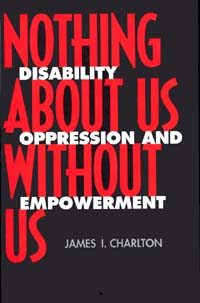 | Title: Nothing about us without us: disability oppression and empowerment Author: Charlton, James I Published: University of California Press, 1998 Subjects: Sociology | Public Policy | Urban Studies Publisher's Description: James Charlton has produced a ringing indictment of disability oppression, which, he says, is rooted in degradation, dependency, and powerlessness and is experienced in some form by five hundred million persons throughout the world who have physical, sensory, cognitive, or developmental disabilities. Nothing About Us Without Us is the first book in the literature on disability to provide a theoretical overview of disability oppression that shows its similarities to, and differences from, racism, sexism, and colonialism. Charlton's analysis is illuminated by interviews he conducted over a ten-year period with disability rights activists throughout the Third World, Europe, and the United States. Charlton finds an antidote for dependency and powerlessness in the resistance to disability oppression that is emerging worldwide. His interviews contain striking stories of self-reliance and empowerment evoking the new consciousness of disability rights activists. As a latecomer among the world's liberation movements, the disability rights movement will gain visibility and momentum from Charlton's elucidation of its history and its political philosophy of self-determination, which is captured in the title of his book. Nothing About Us Without Us expresses the conviction of people with disabilities that they know what is best for them. Charlton's combination of personal involvement and theoretical awareness assures greater understanding of the disability rights movement. [brief] Similar Items |
| 15. |  | Title: Death is that man taking names: intersections of American medicine, law, and culture Author: Burt, Robert 1939- Published: University of California Press, 2002 Subjects: Law | Health Care | History of Medicine | Ethics | Religion Publisher's Description: The American culture of death changed radically in the 1970s. For terminal illnesses, hidden decisions by physicians were rejected in favor of rational self-control by patients asserting their "right to die" - initially by refusing medical treatment and more recently by physician-assisted suicide. This new claim rested on two seemingly irrefutable propositions: first, that death can be a positive good for individuals whose suffering has become intolerable; and second, that death is an inevitable and therefore morally neutral biological event. Death Is That Man Taking Names suggests, however, that a contrary attitude persists in our culture - that death is inherently evil, not just in practical but also in moral terms. The new ethos of rational self-control cannot refute but can only unsuccessfully try to suppress this contrary attitude. The inevitable failure of this suppressive effort provokes ambivalence and clouds rational judgment in many people's minds and paradoxically leads to inflictions of terrible suffering on terminally ill people. Judicial reforms in the 1970s of abortion and capital punishment were driven by similarly high valuations of rationality and public decision-making - rejecting physician control over abortion in favor of individual self-control by pregnant women and subjecting unsupervised jury decisions for capital punishment to supposed rationally guided supervision by judges. These reforms also attempt to suppress persistently ambivalent attitudes toward death, and are therefore prone to inflicting unjustified suffering on pregnant women and death-sentenced prisoners. In this profound and subtle account of psychological and social forces underlying American cultural attitudes toward death, Robert A. Burt maintains that unacknowledged ambivalence is likely to undermine the beneficent goals of post-1970s reforms and harm the very people these changes were intended to help. [brief] Similar Items |
| 16. |  | Title: Reds or rackets?: the making of radical and conservative unions on the waterfront Author: Kimeldorf, Howard Published: University of California Press, 1988 Subjects: Sociology | United States History | Labor Studies Publisher's Description: Why is the American working class different? For generations, scholars and activists alike have wrestled with this question, with an eye to explaining why workers in the United States are not more like their radicalized European counterparts. Approaching the question from a different angle, Reds or Rackets? provides a fascinating examination of the American labor movement from the inside out, as it were, by analyzing the divergent sources of radicalism and conservatism within it. Kimeldorf focuses on the political contrast between East and West Coast longshoremen from World War I through the early years of the Cold War, when the difference between the two unions was greatest. He explores the politics of the West Coast union that developed into a hot bed of working class insurgency and contrasts it with the conservative and racket-ridden East Coast longshoreman's union. Two unions, based in the same industry - as different as night and day. The question posed by Kimeldorf is, why? Why "reds" on one coast and racketeers on the other?To answer this question Kimeldorf provides a systematic comparison of the two unions, illuminating the political consequences of occupational recruitment, industry structure, mobilization strategies, and industrial conflict during this period. In doing so, Reds orRackets? sheds new light on the structural and historical bases of radical and conservative unionism.More than a comparative study of two unions, Reds or Rackets? is an exploration of the dynamics of trade unionism, sources of membership loyalty, and neglected aspects of working class consciousness. It is an incisive and valuable study that will appeal to historians, social scientists, and anyone interested in understanding the political trajectory of twentieth-century American labor. [brief] Similar Items |
| 17. |  | Title: Letters from freedom: post-cold war realities and perspectives Author: Michnik, Adam Published: University of California Press, 1998 Subjects: History | Politics | Russian and Eastern European Studies | Social and Political Thought | European History | Intellectual History Publisher's Description: A hero to many, Polish writer Adam Michnik ranks among today's most fearless and persuasive public figures. His imprisonment by Poland's military regime in the 1980s did nothing to quench his outpouring of writings, many of which were published in English as Letters from Prison . Beginning where that volume ended, Letters from Freedom finds Michnik briefly in prison at the height of the "cold civil war" between authorities and citizens in Poland, then released. Through his continuing essays, articles, and interviews, the reader can follow all the momentous changes of the last decade in Poland and East-Central Europe. Some of the writings have appeared in English in various publications; most are translated here for the first time.Michnik is never detached. His belief that people can get what they want without hatred and violence has always translated into action, and his actions, particularly the activity of writing, have required his contemporaries to think seriously about what it is they want. His commitment to freedom is absolute, but neither wild-eyed nor humorless; with a characteristic combination of idealism and pragmatism, Michnik says, "In the end, politics is the art of foreseeing and implementing the possible."Michnik's blend of conviction and political acumen is perhaps most vividly revealed in the interviews transcribed in the book, whether he is the subject of the interview or is conducting a conversation with Czeslaw Milosz, Vacláv Havel, or Wojciech Jaruzelski. These face-to-face exchanges tell more about the forces at work in contemporary Eastern Europe than could any textbook. Sharing Michnik's intellectual journey through a tumultuous era, we touch on all the subjects important to him in this wide-ranging collection and find they have importance for everyone who values conscience and responsibility. In the words of Jonathan Schell, "Michnik is one of those who bring honor to the last two decades of the twentieth century." [brief] Similar Items |
| 18. | 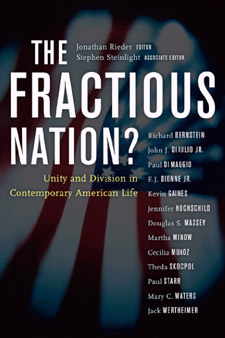 | Title: The fractious nation?: unity and division in contemporary American life Author: Rieder, Jonathan Published: University of California Press, 2003 Subjects: American Studies | Anthropology | Ethnic Studies | Politics | Religion | Sociology | Immigration Publisher's Description: What are we to make of the speed with which the new climate of national solidarity emerged after September 11? Does it not look strange against a backdrop of the much-touted divisiveness of American life? In truth, The Fractious Nation? makes clear, the contrast of the time of divisiveness before and the time of unity that followed is much too stark, indeed. Less than a year before two planes slammed into the World Trade Center, the 2000 presidential election produced not just the starkly blue and red electoral map but also the two tribal Americas those totemic colors emblazoned. And from the cultural wars to immigration restriction, from the Christian right to political correctness, recent decades have witnessed much hand-wringing on the left and the right about the fragmentation of American life. The Fractious Nation? enlists the critical intelligence of fourteen distinguished contributors who illuminate the schisms in American life and the often volatile debates they have inspired in the realms of culture, ethnic and racial pluralism, and political life. The collective wisdom of The Fractious Nation? suggests a counterview to all the overheated rhetoric. The authors warn against fixating on flamboyant incidents of racial conflict when black-and-white values overlap considerably. On a range of cultural issues, the gap between our citizens has closed as well. And even as the rivalry between liberalism and conservatism transmutes into new forms, the political center remains vital and democratic. We are tied together not just by shared values but by institutions - the Constitution, the culture of consumption, the etiquette of ethnic respect. In private life and public affairs, our nation has expanded the meaning of democratic citizenship. Still, there's no room for self-congratulations here. Tendencies toward preoccupation with private life encourage indifference to the suffering of the less privileged. This is also one of the main failings of the narrative of fragmentation: In its focus on matters of shared values, it too distracts from issues of poverty and inequality that also fragment the human spirit. [brief] Similar Items |
| 19. | 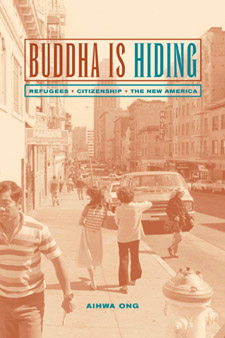 | Title: Buddha is hiding: refugees, citizenship, the new America Author: Ong, Aihwa Published: University of California Press, 2003 Subjects: Anthropology | American Studies | Asian American Studies | Gender Studies | Urban Studies | Sociology | Immigration Publisher's Description: Fleeing the murderous Pol Pot regime, Cambodian refugees arrive in America as at once the victims and the heroes of America's misadventures in Southeast Asia; and their encounters with American citizenship are contradictory as well. Service providers, bureaucrats, and employers exhort them to be self-reliant, individualistic, and free, even as the system and the culture constrain them within terms of ethnicity, race, and class. Buddha Is Hiding tells the story of Cambodian Americans experiencing American citizenship from the bottom-up. Based on extensive fieldwork in Oakland and San Francisco, the study puts a human face on how American institutions - of health, welfare, law, police, church, and industry - affect minority citizens as they negotiate American culture and re-interpret the American dream. In her earlier book, Flexible Citizenship, anthropologist Aihwa Ong wrote of elite Asians shuttling across the Pacific. This parallel study tells the very different story of "the other Asians" whose route takes them from refugee camps to California's inner-city and high-tech enclaves. In Buddha Is Hiding we see these refugees becoming new citizen-subjects through a dual process of being-made and self-making, balancing religious salvation and entrepreneurial values as they endure and undermine, absorb and deflect conflicting lessons about welfare, work, medicine, gender, parenting, and mass culture. Trying to hold on to the values of family and home culture, Cambodian Americans nonetheless often feel that "Buddha is hiding." Tracing the entangled paths of poor and rich Asians in the American nation, Ong raises new questions about the form and meaning of citizenship in an era of globalization. [brief] Similar Items |
| 20. | 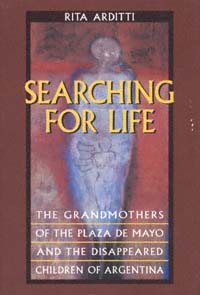 | Title: Searching for life: the grandmothers of the Plaza de Mayo and the disappeared children of Argentina Author: Arditti, Rita 1934- Published: University of California Press, 1999 Subjects: Latin American Studies | Sociology | Gender Studies Publisher's Description: FROM THE BOOK :"I want to touch you and kiss you.""You are my mother's sister and only one year older; you must have something of my mother in you." - A found child after being returned to her family Searching for Life traces the courageous plight of the Grandmothers of the Plaza de Mayo, a group of women who challenged the ruthless dictatorship that ruled Argentina from 1976 to 1983. Acting as both detectives and human rights advocates in an effort to find and recover their grandchildren, the Grandmothers identified fifty-seven of an estimated 500 children who had been kidnapped or born in detention centers. The Grandmothers' work also led to the creation of the National Genetic Data Bank, the only bank of its kind in the world, and to Article 8 of the United Nations Convention on the Rights of the Child, the "right to identity," that is now incorporated in the new adoption legislation in Argentina. Rita Arditti has conducted extensive interviews with twenty Grandmothers and twenty-five others connected with their work; her book is a testament to the courage, persistence, and strength of these "traditional" older women.The importance of the Grandmothers' work has effectively transcended the Argentine situation. Their tenacious pursuit of justice defies the culture of impunity and the historical amnesia that pervades Argentina and much of the rest of the world today. In addition to reconciling the "living disappeared" with their families of origin, these Grandmothers restored a chapter of history that, too, had been abducted and concealed from its rightful heirs. [brief] Similar Items |